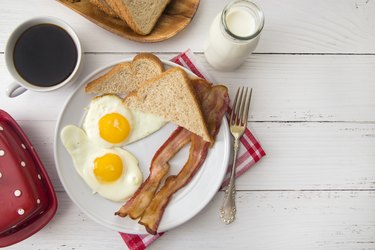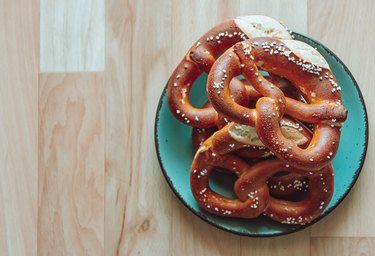
If your poop is a little loose, aka, you're experiencing a bout of diarrhea, know that it's actually a fairly common problem. While that camaraderie may not exactly make you feel better in the moment, the good news is that there are simple changes you can make to your diet to help improve your symptoms.
"Everyone at one point in their lives will experience diarrhea," explains gut health expert Amanda Sauceda, RDN, CLT.
Video of the Day
Video of the Day
"Sometimes you might get diarrhea due to a stomach bug and other times it may be due to diet changes. A good rule of thumb when it comes to bowel movements is you don't want to go more than three days without pooping and don't want to poop more than three times a day."
If you fall into that latter category of going more than three times a day and your stool is loose or watery, don't fret. By limiting some foods in your diet and eating more of others, you may be able to find some relief.
5 Worst Foods for Diarrhea

Try limiting these foods if you're dealing with diarrhea.
1. Coffee
Coffee has a way of getting things going in the morning. Caffeine, the reason many of us drink coffee in the first place, is a stimulant — which affects our central nervous system, making us more alert. Caffeine can also "stimulate" our guts, by acting as a laxative.
"Coffee poops are a thing and if you have diarrhea, drinking coffee can make it worse. Coffee, specifically caffeine, can be hard on the gut when you have diarrhea," explains Sauceda.
If you have diarrhea, you may want to try a caffeine-free tea instead. Although, like decaf coffee, tea can still contain a minimal amount of caffeine, according to the Mayo Clinic.
2. Spicy Foods
They can taste so good going in — it's the second half of the digestion process where spicy foods can get us into trouble.
"Think twice before adding that chile or salsa when you have diarrhea. Spicy foods are more likely to aggravate your gut even if you don't have diarrhea," shares Sauceda.
In general, spicy foods are healthy but if you have irritable bowel syndrome (IBS), inflammatory bowel disease (IBD) or dyspepsia, you'll want to be careful with spicy foods, according to the University of Chicago Medicine. Spicy peppers and seasonings can trigger symptoms.
3. Fatty and Fried Foods
Fried foods don't have any redeeming qualities when it comes to your health. In fact, in some cases, they can wreak havoc.
Sauceda advises to stay away from high-fat foods while you're experiencing symptoms like cramping and loose stool. This is because foods high in fat, especially fried foods, can be hard on the gut even if you don't have diarrhea.
Our bodies can have a tough time digesting a heavy dose of fat like what you may find in fried chicken wings or greasy pizza. If the fats aren't absorbed properly, they continue through our guts to the colon where they're broken down into fatty acids, as explained by Harvard Health Publishing. This causes our colon to secrete fluid, which can trigger or exacerbate diarrhea.
4. Cruciferous Veggies and Other Gas-Producing Foods
"Foods that are known for giving people gas could make diarrhea worse and/or make you feel bloated and uncomfortable," shares Sauceda. "Foods that can make you gassy are crucifers like cabbage or broccoli, legumes like beans, and foods higher in FODMAPs."
Cruciferous vegetables contain a complex carbohydrate called raffinose. This is what actually ferments in our guts as part of normal digestion, causing gas to build up.
Fiber in some foods can lead to gas and foods high in FODMAPs, a short-chain carbohydrate, can give some people digestion issues, too.
5. Sugar-Free Sweeteners
There's no shortage of artificial sweeteners or sugar alcohols in our food supply.
Sauceda explains that these types of sweeteners can be found in sugar-free candies, gums and diet sodas. Having a lot of these sweeteners can pull water into your gut, causing diarrhea or making it worse.
Tip: Rule Out Food Intolerances or Sensitivities
When we eat things that we are intolerant or sensitive to, it can make our diarrhea worse, Sauceda explains. For example, if you have lactose intolerance, eating dairy foods can exacerbate diarrhea.
Other common food intolerances or sensitives include gluten, casein, sulfites (found in red wine and beer) and certain food additives like monosodium glutamate (MSG), per the Cleveland Clinic. Speak to your health care professional if you suspect you have a food intolerance.
What to Eat When You Have Diarrhea

Try adding these foods to your diet if you have loose stool.
1. Bland Foods
Low-fat milk, applesauce, potatoes, eggs, gelatin desserts and pasta are all prime examples of bland foods. These foods (and more) are low in fat and are pretty bland on their own, i.e., minimal spices are used.
"Sticking with foods that are bland can help settle the stomach. This doesn't necessarily mean a B.R.A.T. diet and the reality is sometimes the B.R.A.T. diet doesn't do much help," Sauceda informs us.
B.R.A.T. stands for bananas, rice, applesauce and toast — it is a diet typically prescribed for upset stomachs, including diarrhea.
2. Soups
"Simple soups or broth can be great when you have diarrhea because they are easier for your gut to digest and they help keep you hydrated," explains Sauceda.
Again, you'll want to avoid soups like cream of broccoli or clam chowder because they're higher in fat, which can add to complications. Some good soup options include this Simple Veggie Soup or this Feel Better Chicken Soup.
3. Gut-Friendly Foods
Here's the tricky (and annoying) part — what works for one person may not work for another.
"There really is no specific set of foods that your gut loves. Everyone's gut is unique therefore everyone's gut-friendly foods are unique," Sauceda says. However, probiotic-rich foods, such as yogurt and sauerkraut, are some of the best to help nourish your gut.
"Probiotics often help with digestion," Maxine Yeung, RD, CPT, previously told LIVESTRONG.com. "Many people have an abundance of bad bacteria in their gut, and probiotics can help restore the good bacteria."
"Finding out what your gut-friendly foods are, especially if you have digestive concerns like IBS, can be very powerful. A food diary will be your number one tool for helping to uncover food sensitivities," Sauceda says.
- Mayo Clinic: "Caffeine Content for Coffee, Tea, Soda and More"
- University of Chicago Medicine: "A Hot Topic: Are Spicy Foods Healthy or Dangerous?"
- Harvard Health Publishing: "Is Something in Your Diet Causing Diarrhea?"
- Cleveland Clinic: "Find the Source of Your Food Intolerance (and Finally Find Relief)"